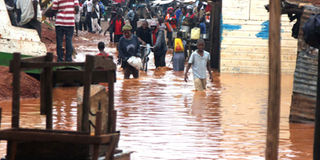The joy and pain of the wet season

Pictures of impassable roads due to heavy rains are common during the wet season. However, besides the floods, the season comes with other things, some bad others good. Photo by Abubaker Lubowa.
What you need to know:
It is not just loose tree branches and garbage that the rain season brings along. With the heavy rains comes benefits for some and problems for others, as Roland D. Nasasira writes.
With the rain season now on, different categories of people like farmers are jubilating because they expect higher yields at harvest time. However, for others, the rain comes with problems that range from the pesky –mud getting stuck to the shoe sole – to the serious, where roads and houses become flooded.
Traffic jam
While its raining, there is hardly any traffic jam. But no sooner does it stop than the roads get congested. A police traffic officer along Jinja Road believes the main cause of the traffic jam during wet seasons is that while the rain is pouring, all the activities stop. “When its raining, people hold back since no one is able to do a lot in the rain,” he says, adding: “After it has rained, majority of the people rush to complete whatever they were doing and they all end up meeting on the roads hence heavy traffic jam.”
Hiked transport fares
The rain is also associated with an increase in transport fares, especially for people who use public means like taxis. Jamil Muwonge, a taxi driver along Bombo Road to Kawempe says the high consumption of fuel by cars during traffic jam compels them to hike the fares. “In a distance where I drive for one hour when there is no jam, I end up spending two hours on the same distance when there is jam,” says Muwonge. “When I’m going to hike the fare from town to Kawempe, from Shs2,000 to Shs2,500, I first talk to the passengers before they board,” he notes. “Instead of using the main road from town to Kawempe, I divert to using the Nakulabye-Kasubi route where there is no jam but after communicating with the passengers,” Muwonge adds.
“With this at the back of their minds, they will pay the Shs2,500 wholeheartedly because they are always tired and want to get home early enough,” he concludes.
Change in commodity prices
Prices of commodities like umbrellas differ slightly from the price that they are sold at in the dry season. In the dry season, a small umbrella in Kikuubo costs Shs5,000 and a larger one goes for Shs8,000, but when the rain season starts , the price may change depending on the demand of the umbrellas, says Agnes Namiggo, who sells umbrellas in Kikuubo. “On good days when it rains almost every day, we can sell as many as 14 dozen, and the rate at which they sell is also very fast,” adds Namiggo.
Peter Musoke, a businessman dealing in sweaters and jackets in Mukwano Arcade says a jacket he sells at Shs18,000 in the dry season goes for between Shs20,000 to Shs25,000 when the rain season kicks in.
“But there is a high demand for jackets in the rainy season, especially at times when people are going home or to work,” notes Musoke. “On a good day, I can retire with profit of Shs50,000 which may not be achievable in the dry season,” he adds.
Just an inconvenience for some
For Daniel Kafeero, a dealer in gumboots, his situation is quite different. “Sometimes I have to wear the gumboots myself because there are some areas, which are difficult to reach like deep inside Owino especially when you have to move and look for stock to keep your business running,” says Kafeero.
He goes on and says unlike other commodities whose prices change depending on seasons like umbrellas, the change in season does not change the prices of gumboots. “If the prices are to change, they change with an increment of between Shs5,000 to Shs10.000,” says Kafeero. He adds that it is factors like increase in taxes on the side of the manufacturers that affects prices, and not the weather conditions.
Crime rates
The rain season does not only escalate commodity prices but it is also associated with high crime rates, especially in the night when thieves take advantage of people sleeping deeply and they break into houses.
Julius Tusingwire the District Police Commander Wandegeya, a Kampala suburb says crime occurrence in his area is low because a lot of precaution measures have been undertaken to eliminate victims of crimes. “This has been achieved by heavy deployment of security personnel in crowded places like clubs and pubs in the night and petrol stations as well as making some foot patrols both during day and night to ensure maximum protection for the people,” says Tusingwire. “If at the end of two days you have only 24 entries of minor crimes, it means there is a low crime rate,” he adds.
The hangouts
You would assume that more people will hit the bar during the wet season, especially if it is indoors but the opposite is true. Some bar owners say they have fewer customers during this season and that is why most of them dread the rain. “During the rainy season, it is cold and wet and therefore I prefer to stay indoors so I stock my fridge at home instead of hitting the bar,” a regular bar goer says.




